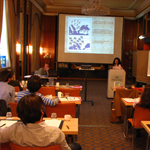Euroacademia Conferences
 Europe Inside-Out: Europe and Europeanness Exposed to Plural Observers (9th Edition) April 24 - 25, 2020
Europe Inside-Out: Europe and Europeanness Exposed to Plural Observers (9th Edition) April 24 - 25, 2020 Identities and Identifications: Politicized Uses of Collective Identities (9th Edition) June 12 - 13, 2020
Identities and Identifications: Politicized Uses of Collective Identities (9th Edition) June 12 - 13, 2020 8th Forum of Critical Studies: Asking Big Questions Again January 24 - 25, 2020
8th Forum of Critical Studies: Asking Big Questions Again January 24 - 25, 2020 Re-Inventing Eastern Europe (7th Edition) December 13 - 14, 2019
Re-Inventing Eastern Europe (7th Edition) December 13 - 14, 2019 The European Union and the Politicization of Europe (8th Edition) October 25 - 26, 2019
The European Union and the Politicization of Europe (8th Edition) October 25 - 26, 2019 Identities and Identifications: Politicized Uses of Collective Identities (8th Edition) June 28 - 29, 2019
Identities and Identifications: Politicized Uses of Collective Identities (8th Edition) June 28 - 29, 2019 The European Union and the Politicization of Europe (7th Edition) January 25 - 26, 2019
The European Union and the Politicization of Europe (7th Edition) January 25 - 26, 2019 7th Forum of Critical Studies: Asking Big Questions Again November 23 - 24, 2018
7th Forum of Critical Studies: Asking Big Questions Again November 23 - 24, 2018 Europe Inside-Out: Europe and Europeanness Exposed to Plural Observers (8th Edition) September 28 - 30, 2018
Europe Inside-Out: Europe and Europeanness Exposed to Plural Observers (8th Edition) September 28 - 30, 2018 Identities and Identifications: Politicized Uses of Collective Identities (7th Edition) June 14 - 15, 2018
Identities and Identifications: Politicized Uses of Collective Identities (7th Edition) June 14 - 15, 2018
Sceptical Images Of The European Union. Euroscepticism Of Turkish University Students
-
-

-
Presentation speakers
- Zeliha Nilüfer Nahya, Independent Researcher
- Download presentation
Abstract:
This study explores how Euroscepticism is [re]produced among a group of university students in the context of historical interpretations of European history and the image of EU. The data for this study was collected during a fieldwork conducted between 20 September 2006 and 1 June 2007 with a group of graduate students from Ankara University and Middle East Technical University in Ankara, Turkey. The research included mostly informal, structured and semi-structured interviews. For the students Europe as a space and EU as a union are not separate from each other or from Europeanness. In their “mental maps”, “continental Europe” and “real Europe” are different. England, Germany and France are considered “real Europe”; some other countries are being included in Europe stage by stage. Students relate the current economic relations of EU with the colonial past of major European countries; and thus EU is associated with colonialism, imperialism and also socialism. These associations form the basis for distrust of EU and doubts about truthfulness about EU. Historical roots of Euroscepticism are derived not only from Europe’s own history but also from the relations between Europe and Ottoman Empire, as well as Turkey. Students mostly point to the last century of Ottoman Empire, the Independence War of Turkey, the Cold War Era and the last two decades of relations with EU. -
Related Presentations

A European Affair: The Role Played By The EC In The Spanish Transition To Democracy
- Alan David Granadino Gonzalez

















